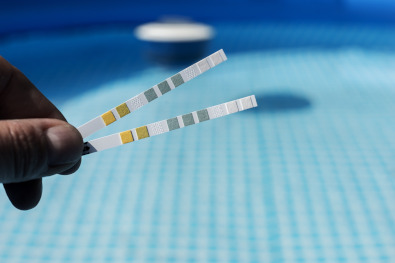The Importance of Pool Water Testing
September 15/2024
Owning a swimming pool comes with a great responsibility: maintaining the water quality to ensure a safe and enjoyable experience for swimmers. One of the key aspects of pool maintenance is regular water testing. In this blog post, we will explore the importance of pool water testing and how it contributes to a healthy and inviting swimming environment.

Ensuring Proper Water Balance:
Maintaining the proper water balance in your pool is crucial. Testing the water allows you to monitor essential parameters such as pH, total alkalinity, and calcium hardness. Imbalances in these levels can lead to various issues, including skin and eye irritation, corrosion of pool equipment, and inefficient sanitization. By testing regularly, you can adjust these parameters as needed and keep the water in optimal condition.
Sanitization and Disinfection Efficiency:
Proper sanitization is vital for keeping pool water free from harmful bacteria, viruses, and other contaminants. The most commonly used sanitizer is chlorine, but other options like bromine or salt systems are also available. Regular water testing helps you ensure that the sanitizer level is within the recommended range for effective disinfection. It allows you to adjust the sanitizer levels, ensuring that swimmers are not exposed to potential health risks.
Algae Prevention and Control:
Algae growth is a common problem in swimming pools, especially when conditions are not adequately controlled. Testing the water for phosphates, nitrates, and other nutrients helps identify potential algae triggers. By keeping these nutrient levels in check, you can prevent or minimize algae growth, which can lead to unsightly and slippery pool surfaces.
Equipment Protection:
Maintaining proper water chemistry through regular testing helps protect your pool equipment. Imbalances in water chemistry can cause corrosion or scaling, leading to premature deterioration of pumps, filters, heaters, and other pool components. By addressing any water chemistry issues promptly, you can extend the lifespan of your equipment and avoid costly repairs or replacements.
Energy Efficiency:
Water testing plays a role in optimizing energy efficiency. When water chemistry is within the recommended ranges, your pool equipment operates more efficiently. This means that pumps, filters, and heaters don't have to work as hard to maintain water quality, resulting in lower energy consumption and reduced operating costs.
Enhanced Swimmer Comfort:
Swimming in a pool with properly balanced and sanitized water is a much more enjoyable experience for swimmers. By regularly testing the water, you can ensure that the pH is within the ideal range, preventing skin and eye irritation. Proper sanitization helps eliminate contaminants, reducing the risk of infections and waterborne illnesses. Clean and clear water also enhances the overall aesthetic appeal of your pool, making it more inviting for everyone.
Conclusion:
Maintaining the water quality of your swimming pool is essential for the safety, health, and enjoyment of swimmers. Regular water testing allows you to monitor and adjust important parameters, ensuring proper water balance, efficient sanitization, and algae prevention. Additionally, it helps protect your pool equipment, promotes energy efficiency, and enhances the comfort and aesthetic appeal of your pool. Make water testing a priority in your pool maintenance routine, and you'll create a safe and inviting swimming environment for all to enjoy.

